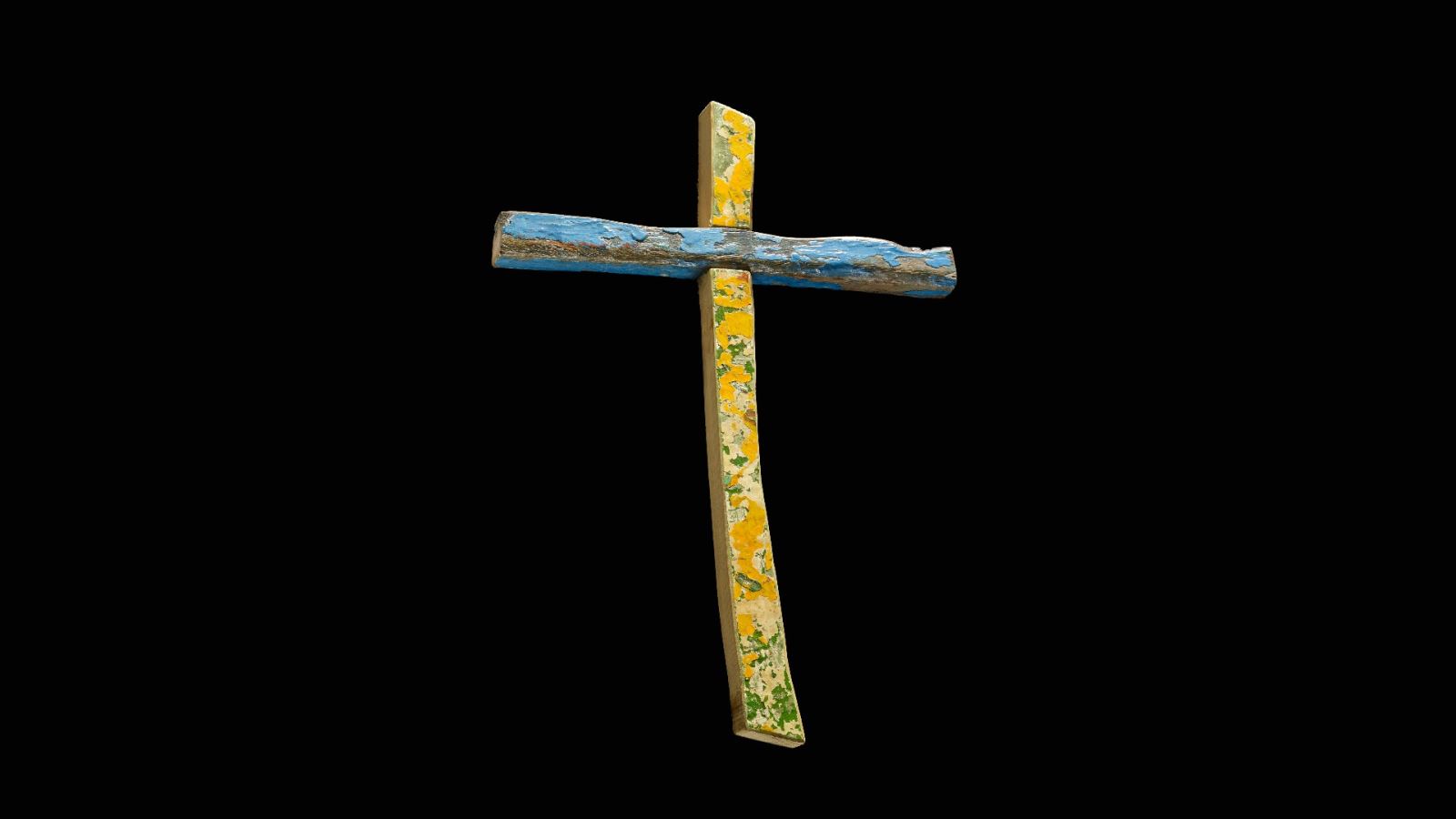Two high-profile loans from the British Museum will go on display at M Shed this summer, encouraging conversation and reflection on migration.

Image: The Lampedusa cross, Francesco Tuccio. Credit: The Trustees of the British Museum.
A British Museum Spotlight Loan Crossings: community and refuge is touring the Lampedusa cross around the UK for the first time, arriving at M Shed on Saturday 18 June.
Made from the remnants of a boat carrying refugees wrecked near the Italian island of Lampedusa, close to the coast of Tunisia, the cross carries poignant messages about kindness, community and the indifference faced by many refugees.
In October 2013, an overcrowded boat carrying 466 migrants from Somalia and Eritrea caught fire, capsized and sank near Lampedusa’s coast. 311 lives, fleeing persecution and seeking refuge in Europe, were lost. Moved by the plight of survivors, the island’s carpenter, Francesco Tuccio, made an individual cross for each person.
Acting as a mark of the 155 survivors’ salvation from the sea and their hope for the future, the cross reflects the fate of many migrants. Tuccio also made larger crosses that he gifted as a plea for discussion about community and responsibility. The British Museum acquired one of these crosses in 2015, simply made from two pieces of brightly painted wood fitted together.
Alongside the cross will be a display of twelve tiny boats from Syrian-born Issam Kourbajʼs series Dark Water, Burning World, made from repurposed bicycle mudguards tightly packed with burnt matches to represent the fragile vessels used by refugees to make their perilous voyages across the Mediterranean. Seeking to evoke the plight of Syrians, these were made by Kourbaj as a response to the ongoing tragedy in Syria.
To accompany the intimate display, M Shed has commissioned a series of audio interviews from five refugees and migrants living in Bristol today to explore the motivations, joys, sorrows and complexities that migration can involve.
Councillor Craig Cheney, Deputy Mayor and Cabinet Member for Culture, said: “I would like to thank the British Museum for the opportunity to host these incredibly moving objects at M Shed. The Lampedusa Cross and Dark Water, Burning World series are emotional reminders of the thousands of people who flee violence, war or persecution. There is no one story of migration - it is a vast, complex, interconnected set of situations. Bristol is a City of Sanctuary, so we recognise the incredible contribution that sanctuary seekers make and seek to celebrate the diversity that makes up our city. The audio interviews that M Shed has commissioned highlight migration stories from people from many different backgrounds. What they all have in common is the sense of place and belonging that they have found as a citizen of Bristol. The full interviews will become part of M Shed’s permanent collection so that these important stories in Bristol's history are preserved for future generations.”
One of the stories told in the display is from Ken Machiara who came to Bristol to study mechanical engineering in 2009. As an openly gay man, he felt it was unsafe to return to Kenya where people are imprisoned for homosexuality. His passion for rugby helped him become a much-loved member of the Bristol Bisons, an LGTBQ+ inclusive club. In 2019 he faced deportation from the home office. His teammates rallied round him and their outcry helped to gain 180,000 signatures for a petition. His case was eventually dropped and he now has confirmed refugee status in the UK where he actively helps provide support for asylum seekers in Bristol.
Director of British Museum, Hartwig Fischer said: “The wood of the cross is a reminder of the passage, not only of these vulnerable refugees who staked everything on the boats being able to safely transport them, but of the human beings throughout history who have sought refuge on similar perilous journeys. I hope visitors in Bristol will connect with the poignancy of the cross and be able to reflect upon the ongoing disruption, upheaval and hope that it symbolises.”
Curator at the British Museum, Jill Cook said: “The Lampedusa Cross reminds us of all the histories that are lost and of the thousands of people who are not otherwise remembered. The wood with its paint blistered by the sun and smelling of salt, sea, and suffering embodies a crisis of our times, as well as hope. The cross invites discussion of the varied reactions to one of the great tragedies of our time. It is an artefact shaped by tragedy that symbolizes those who have nothing and desperately seek to share in a better future. As such, it is touchingly complemented by Issam Koubraj’s little boats.”
Artist Issam Kourbaj said: “Lead was the first material I experimented with when making my boats. I used it for its density, as a response to the many tragedies of sinking boats in the Mediterranean, but also the ancient miniature model ship carrying three goddesses that inspired this piece was made from lead too. Soon after I was drawn to bicycle mudguards, which are designed to protect from the mud, yet sadly many Syrians and many others were not guarded by the flimsy boats, lead-like, that they were so desperate to take to escape the destruction. Spent matches speak about the people of the boats, with burnt parts to reflect the trauma that those women, children and men carry with them, while water-like resin holds these burnt matches together, just as we all bond, hold and support each other in desperate times.”
A British Museum Spotlight Loan Crossings: community and refuge will be located in the Bristol Life gallery at M Shed and is free entry. Tickets for M Shed can be pre-booked at bristolmuseums.org.uk but walk-ups are also welcome.
A British Museum Spotlight Loan Crossings: community and refuge is supported by the Dorset Foundation in memory of Harry M Weinrebe.
Related
Comments
Nobody has commented on this post yet, why not send us your thoughts and be the first?











